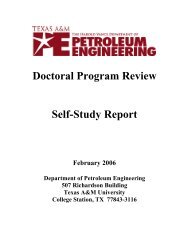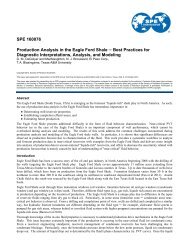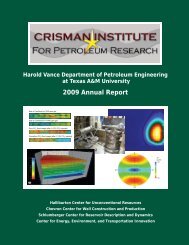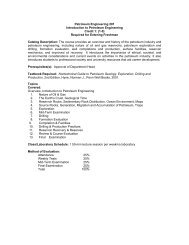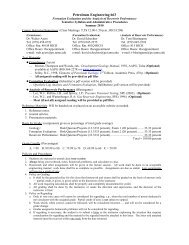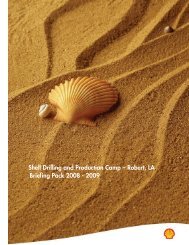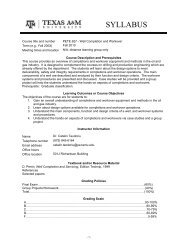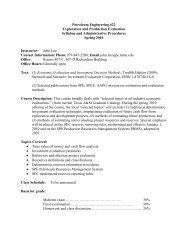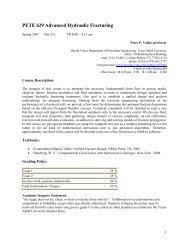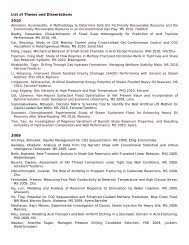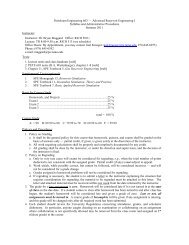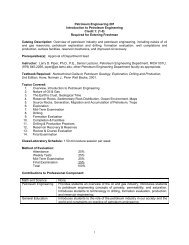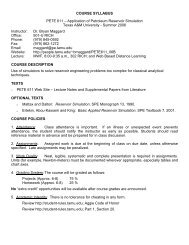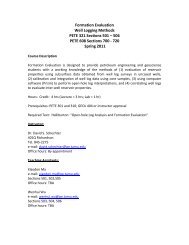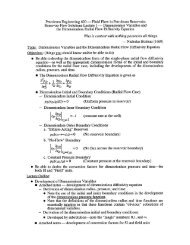Petroleum Engineering 617 Petroleum Reservoir Management (3-0 ...
Petroleum Engineering 617 Petroleum Reservoir Management (3-0 ...
Petroleum Engineering 617 Petroleum Reservoir Management (3-0 ...
You also want an ePaper? Increase the reach of your titles
YUMPU automatically turns print PDFs into web optimized ePapers that Google loves.
<strong>Petroleum</strong> <strong>Engineering</strong> <strong>617</strong><br />
<strong>Petroleum</strong> <strong>Reservoir</strong> <strong>Management</strong> (3-0). Credit 3<br />
W. John Lee<br />
Summer 2011<br />
Revised 5/17/11<br />
Studies of the principles of reservoir management (including resources and reserves<br />
management) and application to specific reservoirs based on case studies presented in the<br />
petroleum literature.<br />
Basis for grade<br />
20% One final written review paper on management practices on a field on which there<br />
is a significant amount of published information (e.g., in SPE papers) on primary<br />
performance, secondary or enhanced recovery project planning, performance,<br />
surveillance, evaluation, modification, operating problems, solutions, etc. For students<br />
seeking reserves certification, these management practices should illustrate resources and<br />
reserves management specifically.<br />
20% Oral presentation of the findings on the field used for the written report.<br />
30% Mid-term examination on papers read and discussed in Weeks 1 to 4.<br />
10% Written reviews of papers. Reviews must be submitted by the beginning of the<br />
class or the grade will be zero. Late or not, all papers must be submitted or the grade at<br />
the end of the semester will be “I.”<br />
20% Attendance and participation. Participation, for both distance learning and<br />
resident students, will be based on responses to study guide questions posted in the<br />
class “discussion board.” Please post your responses prior to start of class each class<br />
day. We will also have further discussion in class among resident students for some<br />
assignments.<br />
References<br />
<strong>Reservoir</strong> <strong>Management</strong>, Reprint Series, SPE, Dallas (1998) 48.<br />
<strong>Petroleum</strong> Resources <strong>Management</strong> System, SPE, Dallas (2007).<br />
Thakur, G. C. and Satter, A.: Integrated Waterflood Asset <strong>Management</strong>, PennWell,<br />
Houston (1998)<br />
Satter, A. and Thakur, G.: Integrated <strong>Petroleum</strong> <strong>Reservoir</strong> <strong>Management</strong>, PennWell,<br />
Houston (1994).
Papers (mostly SPE) on field project planning, implementation, surveillance, evaluation,<br />
modification, problems, solutions. Most are in SPE Reprint Series No. 48 unless<br />
indicated otherwise, but almost all can also be downloaded from the SPE Website.<br />
Vista Account<br />
Because course information will be posted on Vista regularly, I ask that you please<br />
monitor at least once a day. To set up your Vista account for this course, please do the<br />
following:<br />
Go to http://elearning.tamu.edu.<br />
Find the link TAMU. Click the link.<br />
Use your NetID (Neo ID and password) to logon.<br />
Click on the course name.<br />
This should be all you need. If you have questions or problems accessing the course<br />
material in Vista, please contact Mary Lu Epps (marylu.epps@pe.tamu.edu) or Ted<br />
Seidel (ted.seidel@pe.tamu.edu) in the 407 office suite for help.
<strong>Petroleum</strong> <strong>Engineering</strong> <strong>617</strong> 10B<br />
<strong>Petroleum</strong> <strong>Reservoir</strong> <strong>Management</strong> (3-0). Credit 3<br />
W. John Lee<br />
Summer 2010<br />
Revised 5/28/2010<br />
Guidelines for Paper Reviews<br />
It should take no more than one page to summarize a typical paper. Some papers may<br />
require more; use your own judgment. Learn to be concise and to state briefly the<br />
essential ideas communicated.<br />
Usual organization of a review<br />
Authors, title. Use the SPE standard reference style. (You can find it in the SPE<br />
Guide to Publications, which is on the web at http://www.spe.org.)<br />
Problem. Briefly, describe the problem the authors are trying to solve.<br />
Solution. Describe the solution the authors propose. Did they propose a specific<br />
method for part or all the reservoir management process? What is it?<br />
Value. Describe the value of the authors’ solution to the petroleum industry.<br />
Conclusions. Describe the conclusions the authors reached as a result of their<br />
analysis<br />
Approach. Describe what the authors did to validate their proposed solution.<br />
Limitations. List the limitations of the work. Is it applicable to only a certain type<br />
of reservoir or field?<br />
Application. How would you apply the knowledge provided in this paper?<br />
Critique. What questions did the authors leave unanswered? What could the authors<br />
have done to make the paper better?<br />
Objectives of reviewing papers in this class<br />
To learn how to learn from papers (harder than textbooks, but more important in the<br />
long run)<br />
To learn how to identify the really important ideas in papers<br />
To learn how to summarize ideas concisely<br />
To learn how engineers with vastly different points of view think and how they<br />
approach problems and their solutions
<strong>Petroleum</strong> <strong>Engineering</strong> <strong>617</strong> 10B<br />
<strong>Petroleum</strong> <strong>Reservoir</strong> <strong>Management</strong> (3-0). Credit 3<br />
W. John Lee<br />
Summer 2010<br />
Revised 5/28/10<br />
Guidelines for Term Projects<br />
1. Each person in the class will prepare a written report and an oral presentation for<br />
his/her project.<br />
2. Each person will choose a field for discussion based loosely on these criteria: (1)<br />
significant number of papers (at least four) published on the field; (2) field has had, in<br />
addition to primary production, secondary and/or tertiary recovery projects; (3)<br />
published papers include information on geology, primary performance, secondary or<br />
enhanced performance, operating problems/solutions, special facilities; (4) clear<br />
evidence that reservoir management of some kind has been practiced; and (5) the<br />
final paper in the sequence will preferably have been published in the last five years<br />
(to ensure that modern technology is included in the reservoir management process).<br />
3. For students seeking reserves certification, the field chosen should include explicit<br />
efforts to manage resources and reserves as part of the asset management process.<br />
4. Your purpose is to read the literature, focusing in particular on reservoir management<br />
decisions that have (or, sometimes, should have) been made and results of those<br />
decisions. Refer to the early papers in the course on reservoir management<br />
philosophy and determine whether sound, modern practices as recommended by the<br />
authors we have read were followed – and what the consequences were.<br />
5. Prepare an oral presentation on your field requiring about 30 minutes. Be prepared to<br />
answer questions for another 15 minutes or so. Prepare hard copy originals of visual<br />
aids for your presentation. Please prepare PowerPoint files for your presentation. We<br />
will provide guidelines in class for organization and content of your oral presentation.<br />
6. Prepare a written report on your topic, with a length about the same as a typical,<br />
published SPE paper. Length requirements are not rigid, but it is good to learn to be<br />
concise. We will provide guidelines in class for organization and content of your<br />
written report.<br />
7. Select one paper (from those you find in your literature survey) and designate it a<br />
“key paper.” Give your key papers to me one week before your oral presentation. I<br />
will have the paper placed on Vista (or give the class information on how to locate it<br />
on the SPE Web site) and will ask the class to read it in preparation for your<br />
presentation. The key paper should include information on reservoir description,<br />
primary production, secondary or otherwise enhanced recovery projects in the field,<br />
discussions of operating/facilities problems and, hopefully, solutions), resources and<br />
reserves management, and other fundamentally important issues that arose in the
historical management of the field. Your talk and written paper are not limited to<br />
these key papers, of course. All members of the class will prepare a review of each<br />
key paper and submit (as required homework) the review on the day of the<br />
presentation of that topic.



